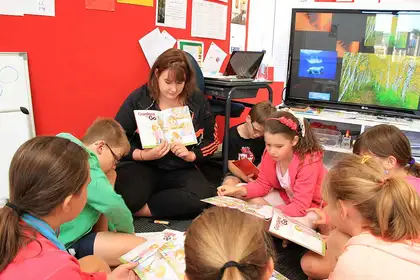
New Zealand teachers keen to hear about the latest research on literacy and learning will be at the conference.
Is more phonics in the early stages of schooling the best way to help youngsters learn to read? Two top UK educators will be in New Zealand next month to talk about teaching reading, writing and spelling – and the positive impact of early phonics teaching.
Professor Rhona Stainthorp and Associate Professor Daisy Powell, from the University of Reading, will discuss their work at the forefront of the UK education system’s push to address falling literacy, and how introducing phonics at the start of schooling is markedly improving reading achievement.
They will be presenting at the inaugural conference of Massey’s Language and Literacy Research Group. It is designed for all teachers, literacy leaders, RTLBs (Resource Teacher: Learning and Behaviour), RTLits (Resource Teachers of Literacy), literacy intervention professionals and anyone who works with children at any age, who are learning to read.
Conference co-organiser Dr Alison Arrow says the UK curriculum focus is on phonics in the first year, with children undertaking a nation-wide phonics test to identify those who are struggling and where teaching is not up to standard.
The visiting professors have addressed areas where the results were lower than the national expectations, Dr Arrow says. “The national mandate for teaching phonics has led to positive outcomes, particularly for children who start school most at risk of having difficulty in learning to read,” she says.
“In New Zealand, the achievement gap in literacy is already evident at school entry and so the teaching ‘why’ and ‘how’ that Daisy and Rhona will be presenting will provide some examples of how to address those needs in the first year or two of schooling.
The conferences will be at Massey’s Auckland campus in Albany on October 10 and repeated at the Manawatū campus in Palmerston North on October 12.
The conferences will focus on how to support learners who are having difficulty in learning to read and write and includes how to support children with communication and developmental language disorders.
Keynote speaker bios:
Professor Rhona Stainthorp is a research professor who began her professional career teaching in an all-boys secondary school where many pupils could not read. To find a way to help those young men, she studied psychology at Birkbeck College, London, then worked as an academic psychologist training teachers and speech and language therapists about the development of literacy and literacy difficulties. Her research relates to reading, spelling and writing development in typical and atypically developing children. She has been advising successive UK governments for the last 25 years on various aspects of the teaching of literacy.
Over the last 12 months she has been contracted to provide workshops to schools in areas where literacy achievement is lower than the English expectations. In her talk, she will discuss basis of spelling and what children need to be able to learn to spell, based on the influential simple view of reading and its companion, the simple view of writing.
Associate Professor Daisy Powell’s research is related to reading and spelling development and the development of number skills. Her specific areas are the effects of the home environment and of technology on learning word-level knowledge. She has also been part of the team contracted to provide workshops in schools in poorer performing areas. In her talk, she will discuss the structure of English language and its implications for teaching phonic knowledge to beginning readers and children at-risk of having difficulties in learning to read.
She also has an established collaboration with researchers in Malaysia and is currently involved in a project, funded by the British Academy and the Malaysian Academy of Science, investigating literacy acquisition in the multilingual Malaysian context.
Conference information:
October 10: 8.45am to 4.30pm - Auckland (Albany campus), Atrium Building.
October 12: 8.45am – 4.30pm – Manawatū campus, Japanese Lecture Theatre.
To register, follow the link: www.massey.ac.nz/literacy-conference